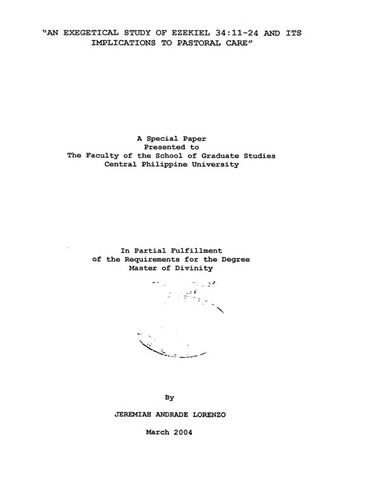An exegetical study of Ezekiel 34:11-24 and its implications to pastoral care
| dc.contributor.adviser | Fabula, Nathaniel M. | |
| dc.contributor.author | Lorenzo, Jeremiah A. | |
| dc.date.accessioned | 2021-04-07T01:20:53Z | |
| dc.date.available | 2021-04-07T01:20:53Z | |
| dc.date.issued | 2004 | |
| dc.identifier.citation | Lorenzo, J. A. (2004). An exegetical study of Ezekiel 34:11-24 and its implications to pastoral care (Unpublished Master's special paper). Central Philippine University, Jaro, Iloilo City. | en_US |
| dc.identifier.uri | https://hdl.handle.net/20.500.12852/723 | |
| dc.description | Abstract only | en_US |
| dc.description.abstract | This study attempts to ask and answer questions arising from the pericope in Ezekiel 34: 11-24, its context and the interpreter's context. An exegetical and analytical study of the pericope will be done. The purpose of this study is for the development of the pastor's understanding of the ministerial task in administering the Ordinances of the Church, and giving pastoral care to churches, institutions, and to a larger community. The questions which are about to be answered in this study are the following: 1. What is the original meaning of the pericope? 2. What are the underlying principles and teaching of the pericope? 3. What are its significance and implications to pastoral care? The result of this study can help seminary students and ministers to carry out ministerial task with expertise and professionalism. Thus, this study provides a background of pastoral care and the ideal situation presented by the prophet Ezekiel in shepherding the flock of God. The methods employed in this study is content analysis. This includes exegesis of the text. In this study, the process of interpretation takes into consideration the historical background and the analytical study of the biblical text itself. The study pays particular attention to the evil shepherds and their evil leadership to the people of Israel, and also the prophet Ezekiel tells about the role model that God has shown by appearing as the Great Good Shepherd. God has shown the ideal pastoral care to all his people in the exile. The model of pastoral care shown by the prophet Ezekiel which Yahweh Himself portrays, is such that the weak is strengthened, the sick is healed, the injured has been bound up, the strayed has been found, the lost has been sought. With this model, every member of the different religious denomination, Ministers, Chaplains, Pastors, Priest, and all the members of the clergy, are encouraged to follow the example of the prophet Ezekiel, and the example shown by God. If these people do not function accordingly, they will be accountable for the lives of the people under their charge (Ezekiel 33:6). | en_US |
| dc.format.extent | vii, 85 leaves | en_US |
| dc.language.iso | en | en_US |
| dc.rights | Attribution-NonCommercial-NoDerivs 3.0 Philippines | * |
| dc.rights.uri | http://creativecommons.org/licenses/by-nc-nd/3.0/ph/ | * |
| dc.subject.ddc | TheoLib Thesis 200.72 L887 | en_US |
| dc.subject.lcsh | Ezekiel (Biblical prophet) | en_US |
| dc.subject.lcsh | Bible. Ezekiel | en_US |
| dc.subject.lcsh | Bible. Ezekiel--Commentaries | en_US |
| dc.subject.lcsh | Pastoral care | en_US |
| dc.title | An exegetical study of Ezekiel 34:11-24 and its implications to pastoral care | en_US |
| dc.type | Special paper | en_US |
| dc.description.bibliographicalreferences | Includes bibliographical references | en_US |
| dc.contributor.chair | David, Fely P. | |
| dc.contributor.department | School of Graduate Studies | en_US |
| dc.description.degree | Master of Divinity | en_US |
Files in this item
This item appears in the following Collection(s)
-
Master of Divinity [35]



